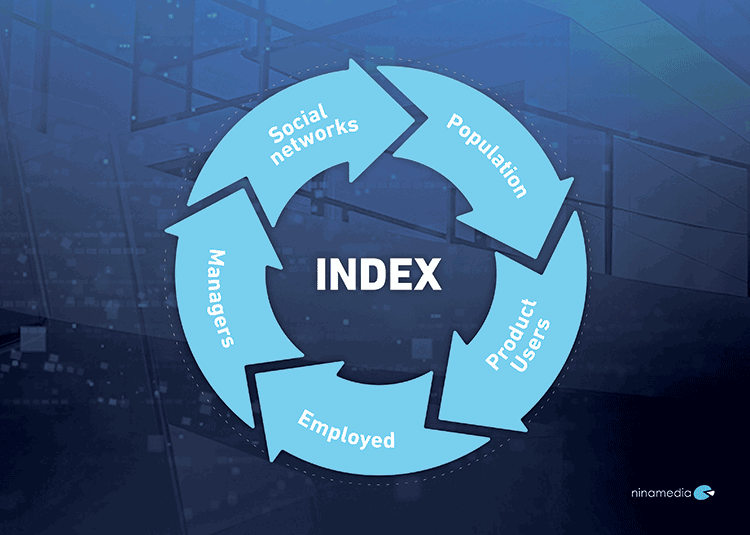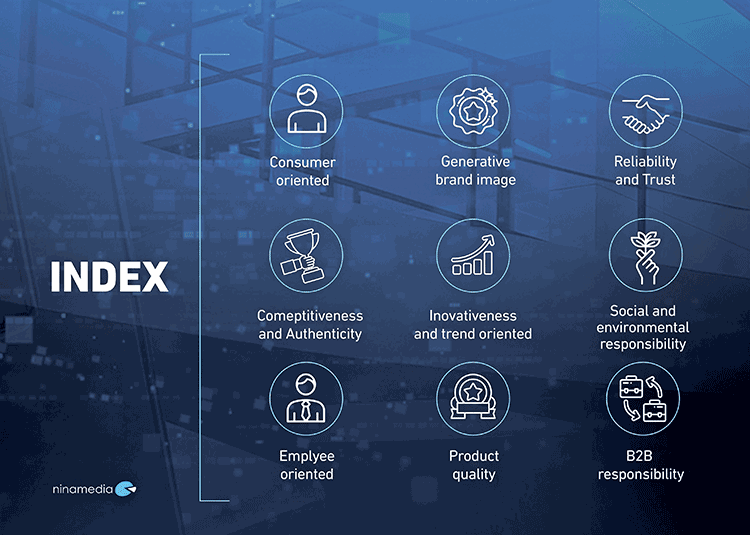Corporate reputation is researched and established by serious multidisciplinary teams of scientists. As of recently, this service has started to be offered in Serbia by Ninamedia. Ninamedia Research is the only research agency in the region to have developed its own methodology for assessing corporate reputation, which it applies successfully. The final finding is expressed in the form of a rating in the Corporate Reputation Index (CRI)
When Facebook changed its name to Meta at the end of October 2021, founder Mark Zuckerberg very rationally explained that the purpose of this move was to create separate names for a large corporation and the world’s most popular social media platform, which has approximately 2.9 billion users. Speaking at the time, Zuckerberg added that the company had great ambitions in terms of developing the socalled Metaverse, which will represent a new chapter in the development of the internet.

As the Facebook founder explained, the company will invest at least 10 billion dollars in the new project. This will enable currently unimaginable experiences for users, who will be able to use virtual avatars to socialise and travel without limitation, but also without leaving their home. And who knows what else. Zuckerberg said that the name change was already being considered back in 2012 and 2014, when the company acquired Instagram and WhatsApp, but that the final decision was made on the eve of the birth of the Metaverse. There’s no doubt that there were many good arguments, right? But there’s at least one ‘however’ in this story, behind which hides a series of challenges that led to a significant decline in Facebook’s reputation, primarily in the U.S.
Less than a month after Zuckerberg announced the change, his former employee, Frances Haugen, testified before the Senate of the United States Congress about the way Facebook is endangering democracy and placing profit before the public good. She accused the company of fomenting hate speech and polarisation among users, because likes are more frequently given to extreme views than neutral ones. And likes lead to profits. Haugen stated at the time that the safety of users, particularly children, had been compromised.
It only seems that there’s no direct link to the facts regarding the way a product or service is currently performing on the market. Ultimately, though, it is definitely connected to crucial parameters like revenue or profit
Facebook has been at the receiving end of various criticisms for years, and that has its price. In June 2017, as much as 77.5% of America’s adult population had a positive opinion of this social media platform, with only 15.11% expressing a negative view. However, four years later, in May 2021, the percentage of positive impressions had dropped to 52.69%, while the negative ones had leapt to 37.47%. If we consider that the company reported profits of 85.9 billion dollars last year (for the sake of comparison, Serbia’s entire GDP for the year was just 60.5 billion dollars), then it is clear why Mark Zuckerberg opted to preserve his exorbitant income instead of the name which had, over the course of 17 years, been added to all world languages and become iconic. He distanced the company from the social media platform, which was accumulating ever more baggage.

What did Mark Zuckerberg actually do? He definitely heeded the advice of good experts who deal with corporate reputation. Simply put, this somewhat obscure term pertains to the way a company is regarded by its stakeholders. And these are not just managers and (co)owners. The full picture comprises a company’s reputation among its employees, but also among its business partners, competitors, investors, banks and even clients (customers, service users), as well as the local or general community in which the company operates. It therefore only seems that there’s no direct link to the facts regarding the way a product or service is currently performing on the market. Ultimately, though, it is definitely connected to crucial parameters like revenue or profit. That’s why it’s no surprise that the need to build and maintain a positive corporate reputation leads to the synergy of business and science, which provides serious methodology and science and research tools enabling the maintaining of a good reputation.

More importantly, these tools ensure that the issue of reputation never wades into the raging waters of unpredictability, which was threatening to happen to Facebook. And not just to this social media platform: let us recall Uber’s 2018 troubles, when a series of accusations led to a significant decline in the brand’s reputation. Such examples are numerous.
Even the owner of a green grocers in Mala Krsna, or the woman who knits sweaters in Sirogojno, know that one must be careful when it comes to business reputation. “Good morning, neighbour!” or “Welcome, please help yourself!” are taken for granted, but what else is hiding “under the bonnet” of business reputation? Companies never fully control the information that’s generated about their operations or brands.
Thousands of negative comments on a social media platform can easily remain “under the radar” of the management, while those seeming to be outsiders who have negative views about a company can become powerful influencers
Following the emergence of social media platforms, which are simultaneously mass media outlets and a means of interpersonal communication, it became far more complex to keep an eye on all possible “escalations”, and even more complex to control them. Many stakeholders form personal views about a company and its brands without having any interaction with the company. Thousands of negative comments on a social media platform can easily remain “under the radar” of the management, while those seeming to be outsiders who have negative views about a company can become powerful influencers. And what can we even say about the possibility of the management not having accurate information about its internal reputation, i.e., the company’s reputation among its employees? This internal reputation has a direct impact on productivity, as well as loyalty to the company.
Corporate reputation definitely cannot be measured by guesses. If that was the case, then pensioners playing dominoes and chess in shabby community halls would make the final judgement. Fortunately, there is someone more competent! Corporate reputation is researched and established by serious multidisciplinary teams of scientists. As of recently, this service has started to be offered in Serbia by Ninamedia. Ninamedia Research is the only research agency in the region to have developed its own methodology for assessing corporate reputation, which it applies successfully. The final finding is expressed in the form of a rating in the Corporate Reputation Index (CRI). With very complex methodology that’s also scientifically and practically verified, through statistical procedures, the numerical value of the index is calculated and represents the ultimate rating of corporate reputation. This rating is reached following the identifying of research subjects and dimensions, after which indicators for each individual dimension are established. This forms the basis to develop an index and instruments for measuring the index. At the end, with a numerical display of the index, i.e., the total score, results are presented to the client according to subjects and dimensions. Only on the basis of this result can company decision-makers competently navigate the ship of their business toward a long-term positive reputation. Otherwise, to use another nautical metaphor, they could be left high and dry.